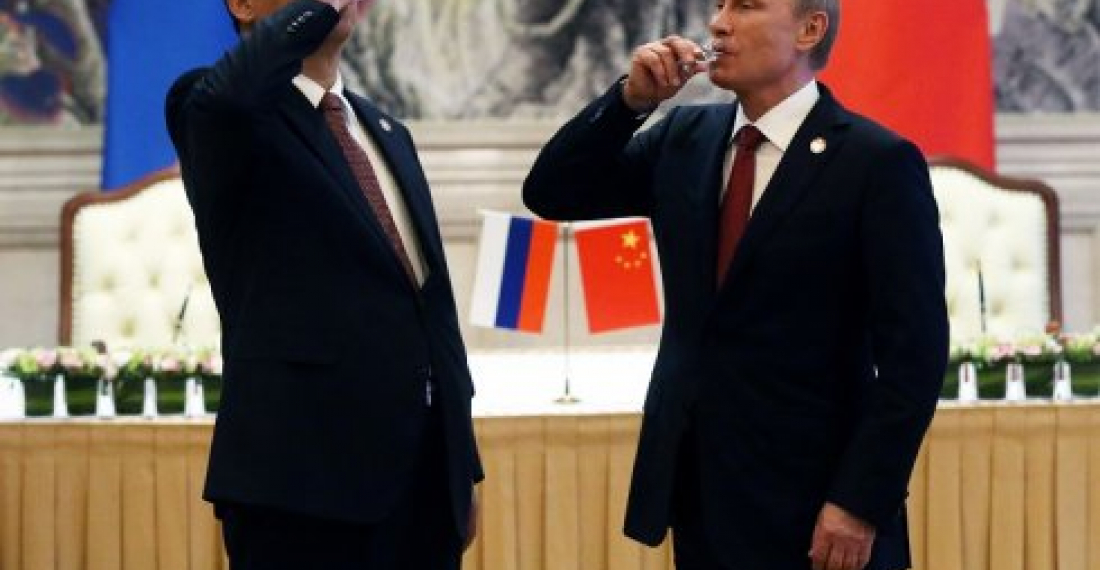In this op-ed for commonspace.eu Benyamin Poghosyan discusses the triangular relationship between China, Russia and the west, and argues that it may offer some opportunities for Armenian foreign policy
Prospects of Russia - China relations are currently hotly debated by international security pundits. The West in general, and the US in particular see these two states as key adversaries seeking to undermine the international world order. Simultaneously, the prevailing mood among Western expert and academic circles is confident that at the end of the day, China is a more significant challenge to Russia than it is to the West, given the vast and scarcely populated areas of Siberia and the Russian Far East bordering China. According to this narrative, in the long term perspective China most probably will make tacit steps to penetrate and eventually control these territories, posing an existential threat to the Russian state.
Meanwhile, key Russian experts dealing with Russia - China relations are not so pessimistic. They perceive the West horror stories about Chinese gradual conquest of the Russian Siberia as too exaggerated to be really taken seriously. They call the reports of more than 10 million Chinese illegal immigrants already populating Russia as pure Western myth. Simultaneously, many of them clearly understand that growing Russia - China cooperation will never be transformed into a military alliance. As recently as November 1, this was confirmed by the Russian Foreign Minister himself, who stated that relations with China had never been at such a high and trusting level in all spheres, but that neither Russia nor China were planning to set up a military alliance. According to Lavrov, this was committed to paper in documents, including those that were signed during Chinese President Xi Jinping's state visit to Russia in June 2019.
The two states have different systems and diverging foreign policy priorities and challenges to think about forging a military alliance. Russia has no intention to be dragged into the territorial disputes in the South China Sea or into the possible military confrontation over the Taiwan. China will never agree to dig deeper into Russia - Eastern Europe problems or make its relations with the US even more complicated by supporting Russia in its current stalemate with Washington.
However, almost all experts accept that the acceleration of the Russia - China strategic partnership coincided with the crisis in the Russia - West relations after 2014. Russia made a decision to sell the most advanced weaponry to China, including S-400 air defense systems and SU - 35 military jets in 2014-2015. The recent announcement of Russian President Vladimir Putin regarding Russia's support in creating an early missile launch warning system in China was another sign of the growing partnership. Meanwhile, the US is not happy to see Russia so in with China. Given American and Chinese predictions that bilateral relations will keep their competitive nature for decades to come, the US is concerned by the prospects of Russia transforming into China's junior partner in this long term geopolitical struggle.
Thus, the American expert community is circulating the ideas of starting the process of normalizing relations with Russia, which definitely will entail some sort of deal concerning the post-Soviet space security architecture. In this regard it is not surprising that key American think tanks, such as RAND, in its October 2019 publication "A Consensus Proposal for a Revised Regional Order in Post-Soviet Europe and Eurasia", and prominent experts, such as Thomas Graham in his latest paper for Foreign Affairs Magazine November - December 2019 issue "Let Russia be Russia", are calling on Russia and the West to find mutually acceptable solutions for the post-Soviet space.
One may ask how all these developments are relevant for Armenia, small landlocked country located in post-soviet Eurasia, under combined Azerbaijan - Turkey pressure, and having only two functioning land borders - with Georgia and Iran? In fact Armenia may strategically gain from both the Russia - China growing partnership, and from any possible rapprochement in Russia - West relations. Armenia is the only South Caucasus state having a military and economic alliance with Russia as a CSTO and Eurasian Economic Union member state. Armenia hosts both a Russian military base and Russian border troops. During his late October visit to Armenia Russian Minister of Defense Army General Shoigu announced that Russian military base there will soon receive modern weaponry, which may double its fire capabilities.
However, Armenia is keen not to put "its all eggs in the Russian basket" and seeks to develop relations with other players too. The growing Russia - China partnership creates possibilities for Armenia to deepen its economic and also military to military relations with China without angering Moscow. Given the fact of China's slow involvement in the region, Beijing has no chances and intentions to challenge Russian positions in Armenia for years to come. Thus, Armenia may gradually increase its cooperation with China without any negative impact on Armenia - Russia relations.
Meanwhile, Armenia also struggles to keep a partnership with key Western players. Yerevan signed a new agreement with EU in November 2017 and continues its cooperation with NATO through IPAPs. Thus, in case of the start of the Russia - West normalization process, Armenia will gain a bigger space for maneuvering in its foreign policy, making steps to deepen its relations with the West without jeopardizing its strategic alliance with Russia.
source: This op-ed was prepared for commonspace.eu by Dr. Benyamin Poghosyan, the Chairman and Founder, Center for Political and Economic Strategic Studies in Yerevan.
photo: The presidents of Russia and China drinking a toast after a recent meeting (archive picture)
The views expressed in opinion pieces and commentaries do not necessarily reflect the position of commonspace.eu or its partners






